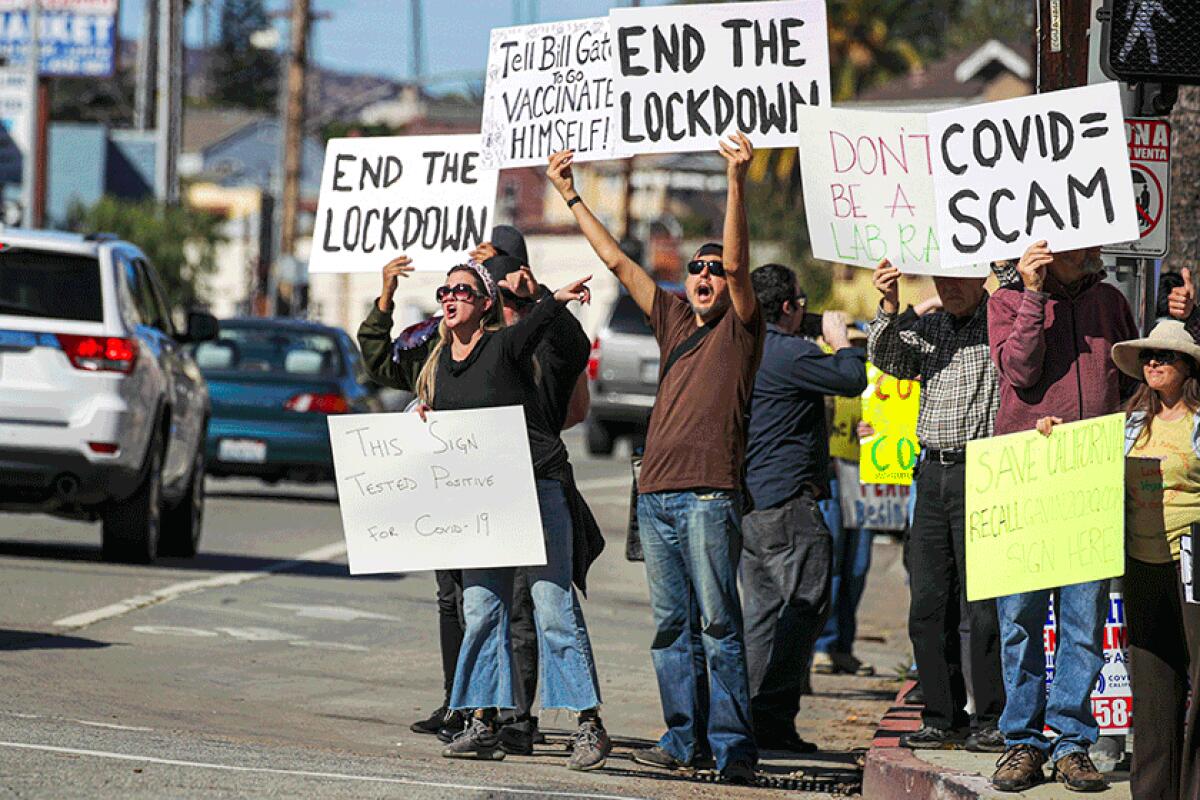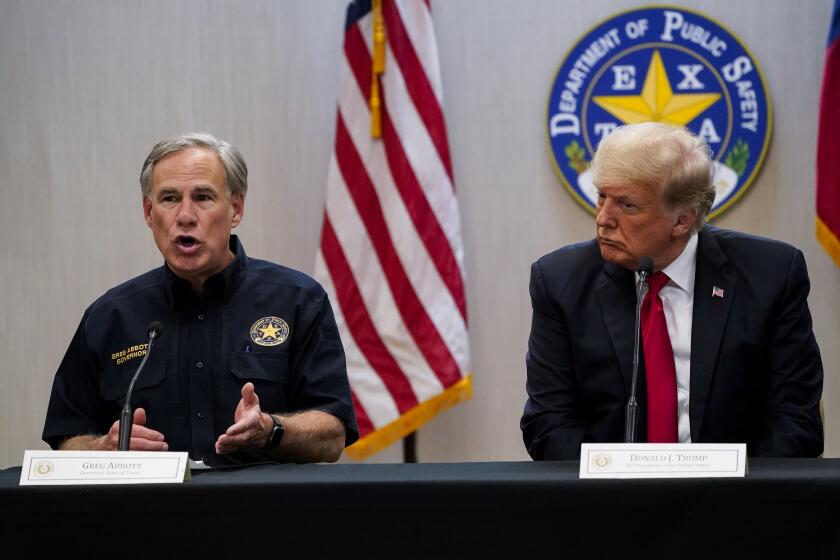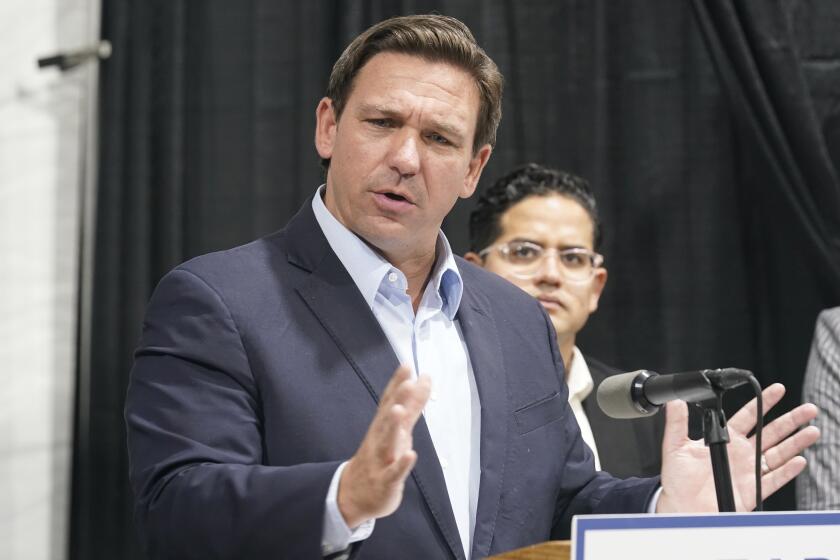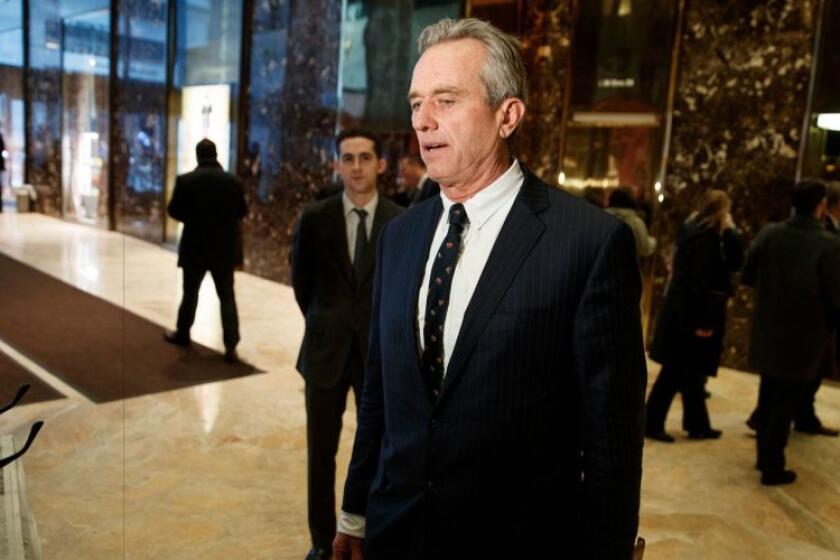Column: Lacking scientific support for their views, anti-vaxxers opt for physical intimidation

“It was a terrifying experience,” Kristina Lawson says.
The president of the Medical Board of California, Lawson was recounting how she was stalked and intimidated by men who identified themselves as representatives of America’s Frontline Doctors, an anti-vaccination organization.
Inside the parking garage attached to her San Francisco Bay Area law office Monday evening, she says, four men jumped out of an SUV that had been parked head-to-head with her car.
You’re not going to have doctors willing to be public health officers if people are going to go to their houses and threaten them and their families.
— State Sen. Richard Pan
Wielding cameras and recording equipment, they confronted her as she tried to get into her car to drive home.
That was at the end of a day that she said had begun with a white SUV parked across from her driveway, and a drone flown over her house.
Get the latest from Michael Hiltzik
Commentary on economics and more from a Pulitzer Prize winner.
You may occasionally receive promotional content from the Los Angeles Times.
“They watched my daughter drive herself to school and watched me walk out of my house, get in my car, and take my two kids to school,” Lawson wrote on Twitter. “That evening ... they ambushed me in a dark parking garage when they suspected I would be alone.”
She said the men identified themselves to her as associates of America’s Frontline Doctors, a prominent anti-vaccination group that has promoted nostrums to treat COVID-19 such as hydroxychloroquine and ivermectin, which have been found to be useless for the purpose, and opposes mask rules. She says the organization’s logos were visible on their jackets and microphones.
The men told police that they just wanted to interview Lawson — but she says they had never reached out to the Medical Board’s press office or her law firm to request an interview. She says a private investigator working with the men told Walnut Creek police that “they are producing a video about me that will include footage of my house and neighborhood and, of course, me.”
Lawson said through a spokesman that she “decided to go public about what happened to me to shed light on these reprehensible, unacceptable tactics of intimidation.”
Sadly, she’s not alone in feeling harassed. Anti-vaccination activists have become more intimidating and physical during the pandemic, in some cases driving public health officials to resign their posts.
“These threats have taken a toll,” the National Assn. of County and City Health Officials told U.S. Atty. Gen. Merrick Garland in an October letter.
Texas Gov. Greg Abbott’s order banning vaccination mandates puts employers, from nursing homes to airlines, in a huge bind.
“At least 300 public health department leaders have left their posts since the pandemic began, impacting 20% of Americans,” the organization said. “In many cases, they have been verbally abused and physically threatened. Their personal information has been shared, their families targeted and their offices attacked. They have been politically scapegoated by some elected officials and either fired or forced to leave their positions for standing up for the health of their communities.”
The organization called on Garland to step up assistance to local law enforcement agencies to improve threat assessments and enforcement.
In August 2019, California state Sen. Richard Pan (D-Sacramento) was assaulted in Sacramento after he introduced bills tightening the state’s rules for vaccine exemptions. The measures became law. Anti-vaccine activist Kenneth Bennett admitted the offense and posted a video of the encounter on Facebook. Pan was uninjured.
Pan on Wednesday condemned the stalking of Lawson and called for law enforcement to investigate.
The reason for the intensifying strategy of physical confrontation and intimidation isn’t hard to determine. Anti-vaccination activists and opponents of social distancing can’t point to scientific support for their positions, because their claims are fictional.
Instead, they resort to what’s known as the heckler’s veto — shouting down responsible health officials at public meetings, making them fear for their own or their families’ safety if they remain in their jobs, and physical threats. On Jan. 30, activists forced the temporary shutdown of a vaccination site at Dodger Stadium with a mass protest.
In August 2020, Michelle Mello of Stanford and colleagues attributed the intensity of attacks on several other factors: “The general decline in civility in political discourse in the U.S., [which] has made ad hominem attacks commonplace and hollowed out traditional ways of grappling with value conflicts,” they wrote. “Social media amplifies such attacks....The environment deteriorates further when elected leaders attack their own public health officials.”
Pan has witnessed what he calls an “escalation of violence” in the anti-vax movement. In 2015, when he introduced a measure to eliminate personal belief exemptions from school immunization requirements, he, his staff and other legislators were subjected to death threats.
Florida’s new surgeon general, Joseph Ladapo, has questioned the safety of COVID vaccines, despite overwhelming evidence that they are safe and effective.
When he introduced a measure in 2019 to regulate the issuance of medical exemptions from vaccine requirements, anti-vaccination protests were stepped up, involving pounding on Capitol walls as if the protesters were trying to break into the chambers.
That was the year Pan was assaulted. In September, during debate on the bill, a protester flung a bag of human blood onto the Senate floor from the visitors gallery, forcing the chamber to be closed for decontamination. The Senate competed its work in a hearing room. The bill was passed and signed into law.
“The chamber had been open to the public for 150 years before that,” Pan told me, “and no one could find that that had ever happened before.”
In September, a House subcommittee heard disturbing testimony about attacks on public health officials. “I found, particularly during our recent Delta surge,” said Louisiana State Health Officer Joseph Kanter, “increased anger and threats made to me personally, some very ugly and with obvious intent to track down my family’s personal identifying information.”
Mysheika W. Roberts, the public health officer in Columbus, Ohio, told the panel how her state’s previous health director, Amy Acton, was subjected to “threats and antisemitic slurs at her home” after she advocated business and school closings early in the pandemic, prompting her to resign.
“Her designated replacement never assumed the job after her contact information become known and she was subject to harassment,” Roberts testified. “In January of this year, the state Department of Health’s assistant medical director had shots fired at her home. We are not immune.”
Other witnesses told of the difficulty of managing through the stress and burnout of unprecedented workloads, often without the support of political leaders who support the anti-vaccination groups or are wary of becoming targets themselves.
The attacks on public health officials seem to focus especially on women and people of color.
Orange County Chief Health Officer Nichole Quick resigned last year after a series of intimidating threats related to her advocating mask rules, culminating in a protester’s reading her home address aloud at a Board of Supervisors meeting. Quick was provided with a security detail when the protester’s comments were interpreted as a death threat.
The anti-vaccine movement has a new conspiracy theory about Pfizer’s COVID-19 shot. Don’t believe them.
In May, Yuba-Sutter Health Officer Phuong Luu was given an armed security escort and advised not to attend public meetings after a local podcaster said she “should be set up against a wall and shot.” He also said, “Somebody should just smash her car, bust her up.” Yuba County obtained a restraining order against the podcaster.
Last month, a speaker at a San Diego County Board of Supervisors meeting hurled racist comments at Dr. Wilma Wooten, the county public health director, who is Black. The supervisors were voting to maintain a vaccination mandate for county employees.
Adding to concerns about anti-vaccination fervor during the pandemic are signs that the anti-vax movement is reaching common cause with far-right political activists. The founder of America’s Frontline Doctors, Beverly Hills physician Simone Gold, was indicted in February for allegedly taking part in the Jan. 6 insurrection at the U.S. Capitol.
That brings us back to the attempted intimidation of Lawson. (Through a spokesman, she said, “like other Californians who believe in both science and fair play, I will not be intimidated.”) The Walnut Creek Police Department said an official report of the encounter is not yet available. Neither America’s Frontline Doctors nor Gold responded to my requests for comment.
The organization became notorious after staging a July 2020 rally in Washington touting hydroxychloroquine, an antimalarial pill, as a “cure” for COVID-19, despite the lack of any scientific evidence for its efficacy.
One of the speakers at that rally was Joseph Ladapo, a hydroxychloroquine and ivermectin promoter who has questioned the efficacy of the COVID vaccines — and whom Florida Gov. Ron DeSantis appointed in September as the state surgeon general.
The nature of the group’s grievance with Lawson is hard to discern, unless it’s merely that she symbolizes government regulation of medicine. If anything, the Medical Board of California has been criticized for moving too slowly to investigate or discipline doctors for spreading COVID-19 misinformation or flouting immunization standards. Under current law, the Department of Public Health is required to refer doctors it suspects of being too lax with immunization exemptions to the Medical Board, which must investigate.
The board’s list of licensed physicians currently facing public accusations of violating immunization standards of care — say by issuing unwarranted medical exemptions — bears only 18 names. Of those cases, four were issued before the pandemic struck in early 2020.
The roster testifies that the Medical Board’s wheels of justice turn slowly — even the most recent cases filed apply to doctors’ actions in 2018 or earlier, before the pandemic.
That’s unsurprising. Although state law now requires the board to investigate doctors who are allegedly violating immunization exemption rules, requirements that schoolchildren be vaccinated against COVID-19 won’t go fully into effect for all children until federal officials issue full authorizations for their vaccinations. So far, federal authorization applies only to the Pfizer-BioNtech vaccine for children 12 and older.
For Pan, the greater concern is the impact of increasingly febrile and threatening protests aimed at public servants. “It’s hard enough to find people willing to put in the time and effort to be public health officers,” he said. “You’re not going to have doctors willing to be public health officers if people are going to go to their houses and threaten them and their families.”
The attacks on public health officials seem to stem from a general breakdown of boundaries that used to define the limits of public participation in governance. It’s being felt by school board members and elected legislators, but perhaps especially acutely by public servants devoted to keeping people healthy and safe.
Pan is searching for an answer that can be drafted into legislation that doesn’t infringe on 1st Amendment rights. “You should have the right to petition your government, but maybe that should only be in government settings,” he says. “What’s the right balance between free speech, versus harassment and intimidation?”
More to Read
Get the latest from Michael Hiltzik
Commentary on economics and more from a Pulitzer Prize winner.
You may occasionally receive promotional content from the Los Angeles Times.














